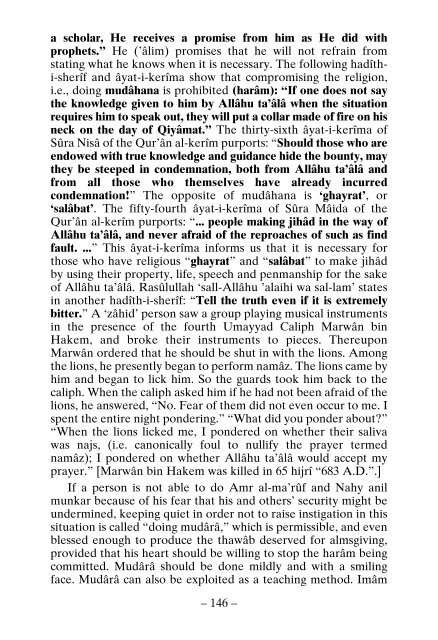Ethics of Islam
Ethics of Islam is taken from the book Berîka by Muhammad Hâdimi. Immorality and ways to get rid of it; 40 depravities and cures to them; usefulness of ethics; what is a soul; strengths of a soul; Personalities emanating from wisdom, courage, chastity and justice are extensively explained.
Ethics of Islam is taken from the book Berîka by Muhammad Hâdimi. Immorality and ways to get rid of it; 40 depravities and cures to them; usefulness of ethics; what is a soul; strengths of a soul; Personalities emanating from wisdom, courage, chastity and justice are extensively explained.
Create successful ePaper yourself
Turn your PDF publications into a flip-book with our unique Google optimized e-Paper software.
a scholar, He receives a promise from him as He did with<br />
prophets.” He (’âlim) promises that he will not refrain from<br />
stating what he knows when it is necessary. The following hadîthi-sherîf<br />
and âyat-i-kerîma show that compromising the religion,<br />
i.e., doing mudâhana is prohibited (harâm): “If one does not say<br />
the knowledge given to him by Allâhu ta’âlâ when the situation<br />
requires him to speak out, they will put a collar made <strong>of</strong> fire on his<br />
neck on the day <strong>of</strong> Qiyâmat.” The thirty-sixth âyat-i-kerîma <strong>of</strong><br />
Sûra Nisâ <strong>of</strong> the Qur’ân al-kerîm purports: “Should those who are<br />
endowed with true knowledge and guidance hide the bounty, may<br />
they be steeped in condemnation, both from Allâhu ta’âlâ and<br />
from all those who themselves have already incurred<br />
condemnation!” The opposite <strong>of</strong> mudâhana is ‘ghayrat’, or<br />
‘salâbat’. The fifty-fourth âyat-i-kerîma <strong>of</strong> Sûra Mâida <strong>of</strong> the<br />
Qur’ân al-kerîm purports: “... people making jihâd in the way <strong>of</strong><br />
Allâhu ta’âlâ, and never afraid <strong>of</strong> the reproaches <strong>of</strong> such as find<br />
fault. ...” This âyat-i-kerîma informs us that it is necessary for<br />
those who have religious “ghayrat” and “salâbat” to make jihâd<br />
by using their property, life, speech and penmanship for the sake<br />
<strong>of</strong> Allâhu ta’âlâ. Rasûlullah ‘sall-Allâhu ’alaihi wa sal-lam’ states<br />
in another hadîth-i-sherîf: “Tell the truth even if it is extremely<br />
bitter.” A ‘zâhid’ person saw a group playing musical instruments<br />
in the presence <strong>of</strong> the fourth Umayyad Caliph Marwân bin<br />
Hakem, and broke their instruments to pieces. Thereupon<br />
Marwân ordered that he should be shut in with the lions. Among<br />
the lions, he presently began to perform namâz. The lions came by<br />
him and began to lick him. So the guards took him back to the<br />
caliph. When the caliph asked him if he had not been afraid <strong>of</strong> the<br />
lions, he answered, “No. Fear <strong>of</strong> them did not even occur to me. I<br />
spent the entire night pondering.” “What did you ponder about?”<br />
“When the lions licked me, I pondered on whether their saliva<br />
was najs, (i.e. canonically foul to nullify the prayer termed<br />
namâz); I pondered on whether Allâhu ta’âlâ would accept my<br />
prayer.” [Marwân bin Hakem was killed in 65 hijrî “683 A.D.”.]<br />
If a person is not able to do Amr al-ma’rûf and Nahy anil<br />
munkar because <strong>of</strong> his fear that his and others’ security might be<br />
undermined, keeping quiet in order not to raise instigation in this<br />
situation is called “doing mudârâ,” which is permissible, and even<br />
blessed enough to produce the thawâb deserved for almsgiving,<br />
provided that his heart should be willing to stop the harâm being<br />
committed. Mudârâ should be done mildly and with a smiling<br />
face. Mudârâ can also be exploited as a teaching method. Imâm<br />
– 146 –

















